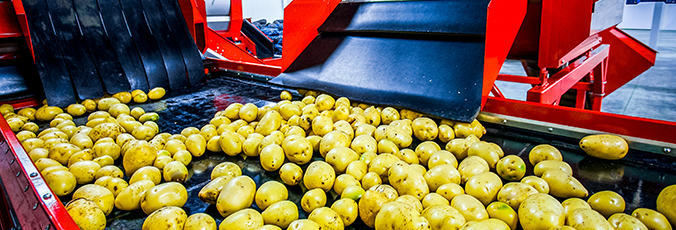
A Fresh Approach to The Food Supply Chain
Delivering food from farm to table is no small feat. With a large, global supply chain, rising customer demands for transparency, and numerous threats from both inside and outside factory walls, many food and beverage operators struggle to keep up. At the same time, increasing compliance requirements and tax obligations demand attention as operators must uphold highly detailed, individualized records for each product.
The Challenges
As the food and beverage industry navigates an increasingly global and customer-centered market, there are four primary challenges growers and operators must address.
Rising Standards for Quality & Consistency
When it comes to what they put in their bodies, today’s consumers have high standards. As interest in health and environmental claims such as non-GMO, organic, grass-fed, and free-range rise, satisfying customers relies on legitimizing claims through targeted and reliable product data, readily accessible via a single scan. Pertinent, product-related insights can range from the fertilizers and pesticides used in the fields, to genetic modification, and animal treatment claims.
Stopping Product Recalls in their Tracks
In a single day, a product recall can transform a favorite craving into a taboo. Mitigating the risk of product recalls requires producers and operators alike to diligently monitor production at all stages for signs of compromise or compliance violations. At the same time, they must also secure their supply chain against attempts to undermine product integrity through tampering or falsification.
Enhancing Efficiency & Control
The growing reach of the global food supply chain and the consumer desire for greater value together challenge food and beverage operators to provide fresh food more efficiently than ever. This requires growers and producers to know and assume responsibility for every ingredient, product, and batch–from the field, to the factory, to the fork, and every stop in between. By achieving a universal product genealogy at every stage of the food lifecycle, producers are better able to scale their operations, enhance operational control, and identify and universalize practices that drive greater efficiency.
Upholding Compliance Standards & Tax Liabilities
The food and beverage industry is highly regulated. With a myriad of government agencies detailing stringent guidelines for growing, harvesting, production, and distribution, producers and operators are not only challenged to abide by a vast number of laws and regulations, but also to serve up accurate, detailed product data in the event of an audit. At the same time, varying tax regulations based on food item and location require sellers to produce product data that is complete, accurate, and secure.

The Solution
With a long track record of servicing compliance-driven businesses through a combination of tamper-proof labeling and product security technology, Ashton Potter delivers a comprehensive solution that is uniquely qualified to help food and beverage growers and operators to secure their global supply chains against threats.
Serialized, Individualized Insight
Ashton Potter allows food and beverage manufacturers to legitimize their claims and secure their products through tamper-proof labeling solutions that assign unique, serialized identities to each crop, ingredient, product, and batch. Drawing upon years of experience in the security printing space, Ashton Potter leverages best-in-class printing techniques that balance security and feasibility, enabling food and beverage producers to efficiently identify every item throughout the supply chain.
Highly scalable to billions of records, Ashton Potter’s flexible labeling solutions enable food and beverage manufacturers to print and apply serialized labels off-site at a secured facility, on-site in the convenience of their own factories, or in the field where crops are harvested.
Traceability throughout the Food Lifecycle
Ashton Potter pairs its serialized labels with ProLinc®, an advanced technology solution that provides total traceability and control throughout the food and beverage supply chain—from seed, to harvest, production, distribution, sale, and beyond.
By assigning serialized identities to every product starting in the field, ProLinc provides growers and operators a highly-detailed record of every product’s genealogy. With a single scan, this detail can be instantly accessed by key stakeholders throughout the supply chain, providing insight into where a product came from, what ingredients were used, and who interacted with it at every stage of the supply chain. In the event of a product recall, this information proves invaluable in targeting and isolating affected batches and resolving issues with minimal risk to consumer health, brand image, or bottom line.
In addition to its traceability capabilities, ProLinc automates compliance reporting to make abiding by government regulations seamless and stores records in a secure, Blockchain-enabled database.
Integration Services & Process Optimization
As a proven partner with specialized knowledge of compliance-driven industries, Ashton Potter augments its technology and labeling solutions with a suite of services that deliver immense efficacy and profitability gains to food and beverage operators. Working with a vast network of integration partners, Ashton Potter provides end-to-end project management, process optimization, on-site and remote training services, and integration with operators’ business intelligence tools of choice. In addition, ProLinc works seamlessly with existing enterprise resource planning systems and field and factory equipment to contextualize insights with other data sources and make insights actionable.

The Results
By eliminating information gaps and associated opportunities for product compromise, ProLinc provides an immediate path to value, including:
- Higher quality production, with claims legitimized and supported by highly-secured data.
- Lower risk of product recalls due to proactive detection of compromises and ease of product isolation and removal.
- Greater transparency into the supply chain that empowers more efficient and scalable production practices.
- Simpler, more effective adherence to compliance standards, achieved through high-quality, high-velocity data insights.